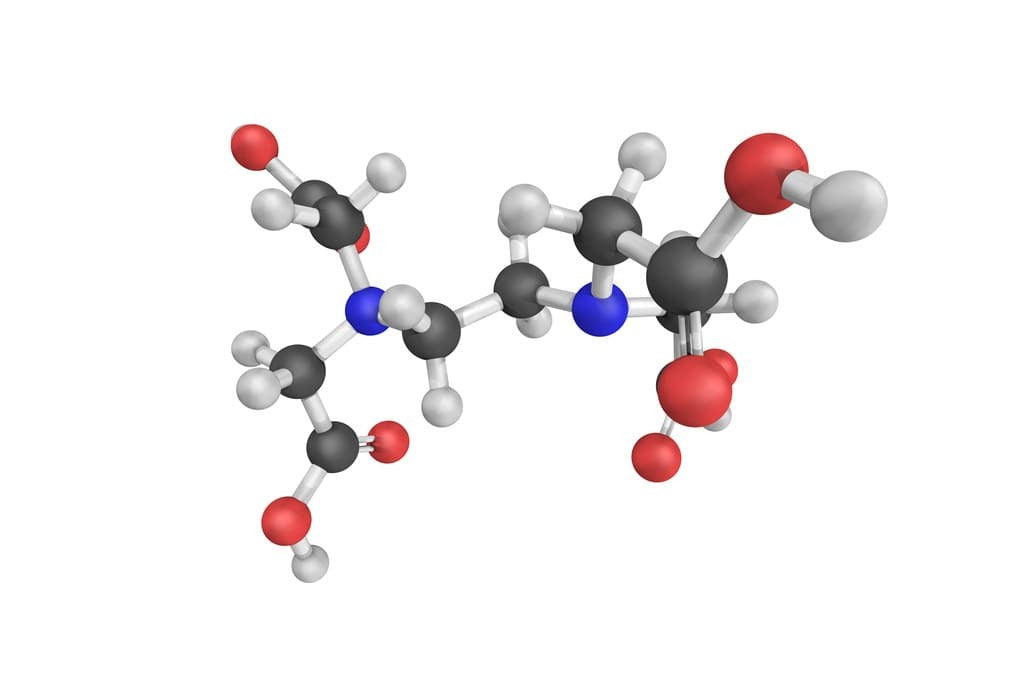
Calcium Disodium EDTA In Food - Preservative In Mayonnaise
Have you ever wondered what makes your favorite brand of mayonnaise last so long? Calcium disodium EDTA is the answer. EDTA stands for Ethylenediaminetetraacetic acid, and this powerful preservative has been used to extend the shelf life of products such as mayonnaise for decades. But what exactly does Calcium disodium EDTA do? In this post, we'll dive deeper into why food manufacturers include this compound in their recipes and explore its potential dangers and health benefits.
Before exploring further, please read the disclaimer located at the end of this webpage.
Overview Of Calcium Disodium EDTA
Calcium disodium EDTA (Ethylenediaminetetraacetic acid) is a popular food preservative and stabilizer used for decades in the food industry. It is a white, odorless powder that can dissolve in water with a slightly salty taste. The chemical formula for calcium disodium EDTA is C10H12O8N2Ca.Na2. Other names such as EDTA-CaNa2, disodium calcium edetate, and Versenex are also used.
Common Uses Of Calcium Disodium EDTA
Calcium disodium EDTA is a commonly used chelating agent, which binds and removes heavy metals from the body. This makes it worthwhile in a variety of applications, including:

Food Preservation
Calcium disodium EDTA is often added to canned foods and soft drinks to prevent discoloration and prolong shelf life. It helps maintain the color and texture of food by preventing the breakdown of pigments and enzymes. In addition, it prevents spoilage caused by metals that may be present in water or canning equipment.
Learn more: Is Calcium Disodium Edta Vegan? Vegan Lifestyle With Edta
Cosmetics
Calcium disodium EDTA is also used in cosmetics as a preservative to extend the shelf life of products. It works by binding to metal ions that can promote the growth of bacteria and fungi, preventing them from breaking down the product.
Water Treatment
In water treatment, calcium disodium EDTA removes heavy metals such as lead, mercury, and copper from drinking water. These metals can be harmful to human health if consumed in high concentrations, so it is important to remove them before water is distributed for consumption.
Medical Treatments
Calcium disodium EDTA is also used in medical treatments, primarily as a chelation therapy for heavy metal poisoning. It can help remove harmful metals from the body, such as lead, mercury, and cadmium, which can accumulate over time and cause health problems.
Industrial Applications
In industrial settings, calcium disodium EDTA is often used to prevent the adverse effects of metal ions on manufacturing processes. It can prevent metal ions from catalyzing unwanted chemical reactions or causing discoloration or degradation of products.
Veterinary Medicine

Calcium disodium EDTA is also commonly used in veterinary medicine to treat animal heavy metal poisoning. This can occur due to ingesting contaminated food, water, or other substances.
Calcium disodium EDTA has a wide range of uses in various industries and can provide numerous benefits, from preserving food to protecting human and animal health. Its ability to chelate heavy metals makes it a valuable ingredient in many products and treatments.
What Food You Can Find Calcium Disodium EDTA?
Calcium Disodium EDTA is a food additive that is used to prevent discoloration and maintain flavor in various processed foods. It is a chemical compound that resembles salt and is commonly found in the ingredient list of packaged foods.
Some common sources of Calcium Disodium EDTA include:
- Soft drinks and distilled alcoholic beverages: Many soft drink companies use Calcium Disodium EDTA as a preservative to maintain the color of their beverages.
- Canned fruits and vegetables: Calcium Disodium EDTA is commonly added to canned fruits and vegetables to prevent browning and discoloration.
- Pickled vegetables, such as cabbage and cucumbers
- Salad dressings: This food additive can be found in many salad dressings, as it helps keep the sauce looking fresh for longer.
- Dairy products: Some dairy products, such as cheese spread, may contain Calcium Disodium EDTA to maintain their flavor and appearance.
- Processed meats: Calcium Disodium EDTA is often added to processed meats like sausage and deli meats to prevent discoloration.
- Canned crab, clam, and shrimp
- Infant formula: Some brands of infant formula may contain small amounts of Calcium Disodium EDTA as a preservative.

It is worth noting that while Calcium Disodium EDTA is generally considered safe in small amounts, some studies have linked it to potential adverse health effects when consumed in large quantities. Therefore, consuming processed foods containing this additive in moderation is essential.
The Role Of Calcium Disodium EDTA In Food and How It Works?
Calcium disodium EDTA is an effective chelating agent that binds with metal ions, preventing them from oxidizing and causing food spoilage.
When added to foods, calcium disodium EDTA acts as a preservative by stabilizing the color, flavor, and texture of food products.
One of the main functions of calcium disodium EDTA in food is to prevent rancidity. When exposed to oxygen, fats and oils can oxidize and produce off-flavors and odors. By chelating metal ions, calcium disodium EDTA helps slow down the oxidation process and extend the shelf life of food products.
In addition to its role as a preservative, calcium disodium EDTA also has other essential functions in food. It is often added to canned fruits and vegetables to maintain their texture and prevent them from becoming mushy. It also helps preserve the color of fruits and vegetables by preventing the breakdown of pigments.
Moreover, calcium disodium EDTA is used as an emulsifier in dressings and sauces. It helps blend ingredients that normally separate, creating a smooth and consistent texture.
Another important aspect of calcium disodium EDTA's role in food is its ability to act as a flavor enhancer. Binding with metal ions can reduce certain foods' metallic taste and improve their overall flavor.
However, there has been some concern regarding the safety of calcium disodium EDTA in food. While studies have shown that it is generally safe for consumption, there have been reports of allergic reactions and potential negative effects on the liver and kidneys.
To address these concerns, regulatory bodies such as the FDA have set limits on the amount of calcium disodium EDTA that can be used in food products. It is also important for individuals to check labels and limit their intake of processed foods containing this additive.
Side Effects Of EDTA In Food
While calcium disodium EDTA is generally considered safe for consumption in small amounts, there have been some concerns about its potential side effects.
Some studies have linked high levels of EDTA intake to negative effects on the liver and kidneys [3], [4]. This is due to the fact that EDTA can bind with essential minerals and remove them from the body, leading to potential deficiencies.
Additionally, some individuals may experience allergic reactions to EDTA, such as fever, nausea, chills, fatigue, and joint pain [3].
To minimize potential side effects, it is vital for individuals to consume processed foods containing calcium disodium EDTA in moderation and to consult with a healthcare professional if they have any concerns. It is also recommended to read ingredient labels and choose products with lower levels of this additive.
Calcium Disodium Edta In Mayonnaise

Mayonnaise is a popular condiment commonly used in sandwiches, dressings, and dips. It is made primarily of oil, egg yolks, vinegar or lemon juice, and seasonings.
Calcium disodium EDTA may be added to mayonnaise as a preservative to prevent the oxidation of fats and oils. This helps maintain the mayonnaise's flavor and texture and extend its shelf life.
Additionally, calcium disodium EDTA can act as an emulsifier in mayonnaise, helping to keep the ingredients blended and create a smooth and creamy texture.
However, as with other processed foods containing this additive, consuming mayo in moderation is crucial, and checking labels for any potential allergens or excessive amounts of calcium disodium EDTA is vital. Choosing homemade mayo or mayonnaise made with natural preservatives may be a healthier option for those looking to limit their intake of additives.
Frequently Asked Questions
Is Calcium Disodium Edta Safe On Food?
Calcium Disodium EDTA is considered safe for consumption in small amounts as approved by regulatory bodies like the FDA.
Is It Possible To Purchase Mayonnaise That Does Not Contain Edta?
It is possible to purchase mayonnaise that does not contain EDTA. Several organic and natural food brands offer mayonnaise products free from EDTA and other artificial preservatives. Always check the product's ingredient list to confirm.
References
- [1] Demidyuk, I. V. (2013). Protealysin. Elsevier EBooks, 597–602. https://doi.org/10.1016/b978-0-12-382219-2.00123-x
- [2] Mary Ann Howland. (2023). Edetate Calcium Disodium (CaNa2Edta). McGraw Hill Medical. https://accesspharmacy.mhmedical.com/content.aspx?bookid=2569§ionid=210263402
- [3] Europe PMC. (2016). Europe PMC. Europepmc.org. https://europepmc.org/article/nbk/nbk5658
- [4] Williams, J. D., Matthews, G. A., & Judd, A. W. (1962). Oral Calcium Disodium Versenate in Treatment of Lead Poisoning. Occupational and Environmental Medicine, 19(3), 211–215. https://doi.org/10.1136/oem.19.3.211
Author

Product Disclaimer
The dietary supplement products mentioned on this website are formulated based on scientific research and adhere to FDA guidelines for dietary supplements. However, the content of the articles has not been evaluated by the Food and Drug Administration (FDA) and is not intended to promote or endorse any specific product. Any products sold on this website are not intended to diagnose, treat, cure, or prevent any disease.
Opinions and Endorsements
Any claims, statements, or opinions expressed in the articles are those of the author(s) and do not necessarily reflect the views or opinions of the manufacturers of the dietary supplement products. The products sold on this website are separate from the content of the articles and are not directly endorsed or associated with the information presented here.
Liability Disclaimer
The author(s) of the articles, website, and manufacturers of the dietary supplement products do not assume any liability for any potential consequences arising from the use of the information provided in the articles. It is recommended that individuals consult with a qualified healthcare professional before making any dietary or lifestyle changes, including the use of dietary supplements.
Product Usage
Please refer to the product labels and packaging for specific usage instructions and guidelines for the dietary supplement products sold on this website.
Customer Support
For any concerns or questions regarding the dietary supplement products, please contact our customer support team, who will be more than happy to assist you.





Leave a Comment
Be the first to comment.
What do you think?